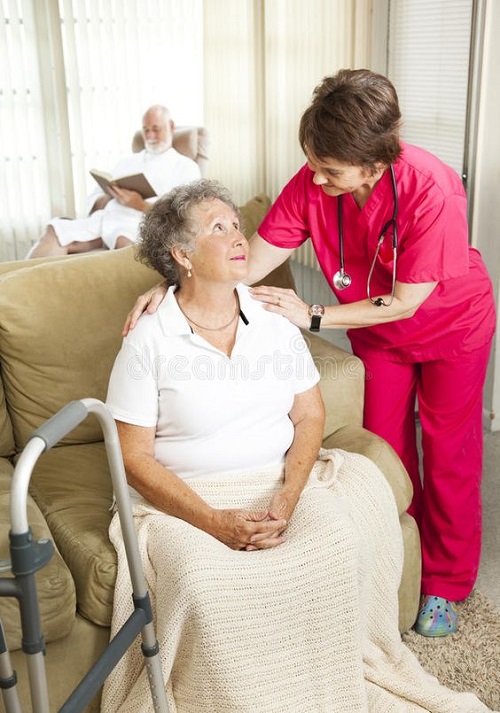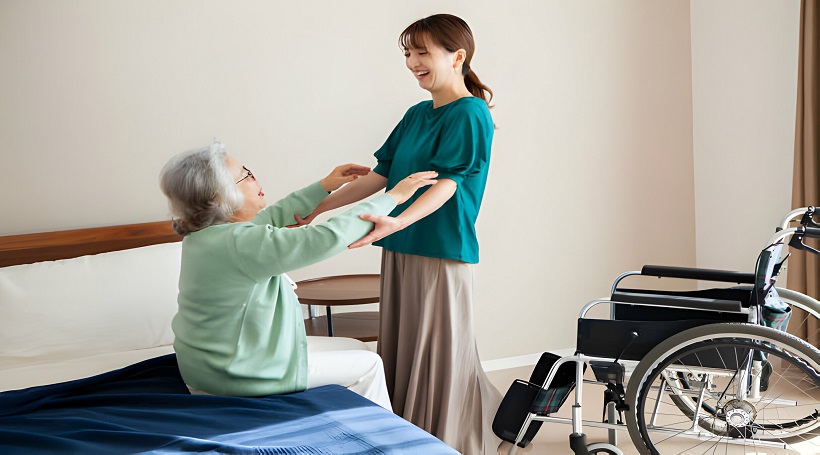It is essential to consider placing a mother in a nursing home when her care needs surpass what can be provided at home. Caring for an aging parent can be demanding, and there may come a time when specialized care in a nursing home is the best option.
Factors to consider include declining health, safety concerns, and the ability to meet her physical and emotional needs. It’s important to have open and honest discussions with family members and healthcare professionals to make the best decision for your mother’s well-being.
Additionally, researching and visiting potential nursing homes, discussing financial considerations, and ensuring her comfort and quality of life are all important steps to take into account. It’s a difficult decision, but ultimately, the goal is to ensure the best care for your loved one.
Signs Of Declining Health

As loved ones age, it becomes crucial to monitor their health closely. Recognizing the signs of declining health is imperative in determining when it might be necessary to transition a mother to a nursing home. Two key areas to consider are physical decline and cognitive decline. Identifying these warning signs early can ensure that appropriate care is provided and enhance the overall well-being of your mother.
Read More – Should I Take Mother Out Of Nursing Home?
Physical Decline
Physical decline can manifest in several ways, making it essential to be attentive to changes in your mother’s health and well-being. Below are some common signs:
- Loss of balance and frequent falls
- Difficulty with basic motor skills, such as walking or grasping objects
- Chronic pain or limited mobility
- Struggling with activities of daily living (ADLs) including bathing, dressing, and toileting
- Noticeable weight loss or gain
- Frequent exhaustion or fatigue
- Visual or auditory impairments that impact daily functioning
These physical indicators may indicate that your mother requires more comprehensive care and assistance than can be provided at home. It is important to consult with her healthcare provider to evaluate the situation and consider the best course of action.
Cognitive Decline
When it comes to cognitive decline, changes in memory, thinking, and behavior can be early signs of conditions like dementia or Alzheimer’s disease. Monitoring your mother’s cognitive abilities can help you determine if nursing home care is needed. Look out for the following:
- Memory loss, especially with recent events or familiar names
- Difficulty concentrating or making decisions
- Confusion regarding time, places, or people
- Repetitive behaviors or statements
- Disorientation or getting lost in familiar surroundings
- Changes in mood or personality
- Withdrawal from social activities or hobbies
Should your mother exhibit any of these cognitive decline symptoms, it may be time to consider professional care in a nursing home setting. Proper guidance from healthcare professionals can help ensure she receives the specialized support she needs.
Read More – Which Mother Is Seated First At A Wedding?
The Need For Round-the-clock Care
When it becomes challenging to provide the necessary care for an aging loved one, it may be time to consider the option of placing them in a nursing home. The Need for Round-the-Clock Care is often a crucial factor in making this decision. This round-the-clock care becomes essential when an elderly individual reaches a point where they are unable to perform daily activities and become increasingly dependent on others.
Inability To Perform Daily Activities
One of the primary indicators that an aging parent may need round-the-clock care in a nursing home is their inability to perform basic daily activities. This includes tasks such as bathing, dressing, toileting, and grooming. When an elderly individual struggles to carry out these fundamental activities independently, it can become a strong signal that they require more comprehensive care than a nursing home can provide.
Increased Dependence On Others
As seniors become older, their reliance on others for assistance tends to grow. They may need help with mobility, medication management, and managing chronic health conditions. This increased dependence on others can lead to a need for 24/7 care, as it becomes essential to have someone available at all times to provide necessary support and aid in case of emergencies.
Safety Concerns
When considering the decision to put a mother in a nursing home, safety concerns are often a primary factor. The well-being and safety of your loved one are paramount, which may lead you to consider if a nursing home is the best option. Safety concerns can encompass a range of issues, from frequent accidents or falls to wandering or getting lost. Addressing these concerns early on is crucial in ensuring the best care and environment for your mother.
Frequent Accidents Or Falls
A primary safety concern to consider is whether your mother is experiencing frequent accidents or falls. If she’s struggling with balance, mobility, or physical health issues that put her at risk for falls, a nursing home may offer the necessary support and supervision to minimize these incidents. Furthermore, nursing homes are equipped with safety measures and staff who can provide immediate assistance in case of an emergency.
Wandering Or Getting Lost
Wandering or getting lost is another critical safety concern. If your mother is prone to wandering or has memory-related conditions such as dementia, she may be at risk of getting lost or encountering unsafe situations. Nursing homes can provide a controlled and secure environment, minimizing the risk of wandering and ensuring her safety at all times.
Read More – What Is The Significance Of Mother Teresa’S Work?
Caregiver Burnout
When it comes to caring for an aging parent or loved one, the responsibility can often become overwhelming. Caregiver burnout is a very real and common issue that many individuals face when taking on the role of caring for a loved one. The physical and emotional exhaustion, combined with neglecting one’s health, can have serious consequences. In this section, we will explore the signs of caregiver burnout and why it is important to address this issue.
Physical And Emotional Exhaustion
Providing around-the-clock care for a loved one can leave caregivers feeling physically and emotionally drained. The physical demands of lifting, assisting with daily activities and ensuring their loved one’s comfort can take a toll on their bodies. At the same time, the emotional weight of witnessing the decline of a loved one and dealing with challenging behaviors can lead to extreme emotional exhaustion.
Caregivers may experience symptoms such as chronic fatigue, headaches, muscle pain, and difficulty concentrating. They may also find themselves feeling irritable, anxious, or depressed. These physical and emotional symptoms are clear indicators of caregiver burnout and should not be ignored.
Neglecting One’s Own Health
When caught up in the responsibilities of caregiving, caregivers often neglect their health and well-being. The focus is solely on the needs of their loved one, while their own needs take a backseat. This neglect can have severe consequences and could result in caregivers developing their health issues.
Caregivers must prioritize their self-care and well-being by making time for regular exercise, maintaining a healthy diet, and attending necessary medical check-ups. By neglecting one’s health, caregivers may end up compromising their ability to care for their loved one effectively.
Inadequate Support System
Another reason why caregiver burnout occurs is the lack of a strong support system. Feeling isolated and unsupported can intensify the stress and burden of caregiving. Caregivers should reach out to family members, friends, and support groups to share their experiences and seek assistance when needed.
In addition, seeking professional help, such as a therapist or counselor, can provide caregivers with the necessary tools and coping strategies to navigate the challenges of caregiving and prevent burnout.
Preventing Burnout
Recognizing the signs of caregiver burnout early on is crucial to prevent further physical and emotional strain. Caregivers need to prioritize their well-being and seek help when needed. By taking the necessary steps, caregivers can provide better care for their loved ones while also maintaining their health and happiness.
Choosing The Right Nursing Home
Choosing the right nursing home for your mother requires careful consideration and thorough research. It’s important to assess her needs, the quality of care provided, and the reputation of the facility. Take time to visit and ask questions to ensure you make the best decision for her well-being.
When the time comes to make the difficult decision of placing your mother in a nursing home, ensuring that you choose the right one is of utmost importance. Thorough research and visits, as well as consideration of cost and location, are key factors to take into account when making this decision.
Thorough Research And Visits
Thorough research is crucial when it comes to selecting a nursing home for your mother. By taking the time to gather information about different facilities, you can make a well-informed decision that will provide her with the care and support she needs. Look for online reviews, ratings, and testimonials from both residents and family members to gain insights into the quality of care provided by each facility.
Visiting potential nursing homes is another essential step in choosing the right one for your mother. Arrange a tour where you can observe the facility, interact with staff members, and get a sense of the overall atmosphere. Pay attention to the cleanliness of the rooms, common areas, and dining facilities. Talk to the staff and ask questions about the level of care provided, the staff-to-resident ratio, and the activities and services available. Observing how the staff interacts with residents can also give you valuable insights into the quality of care your mother would receive.
Consideration Of Cost And Location
Cost and location are two practical factors that should be taken into consideration when choosing a nursing home for your mother.
First, consider the cost. Determine the budget you have available and compare the costs of different facilities. Keep in mind that lower cost does not always mean lower quality of care, and vice versa. Take into account the specific services and amenities offered by each facility and weigh them against your budget and financial capabilities.
Next, think about the location of the nursing home. Ideally, you want a facility that is located close to family and friends. This will make it easier for them to visit and provide emotional support to your mother. Additionally, consider the accessibility of medical facilities and specialists in the area. Easy access to healthcare services will ensure that your mother receives the necessary medical attention promptly.
By conducting thorough research, visiting potential nursing homes, and considering the cost and location, you can make an informed decision about choosing the right nursing home for your mother. Remember that this decision is an important one, so take the time to gather all the necessary information and involve your mother in the decision-making process when possible.

Frequently Asked Questions Of When To Put Mother In A Nursing Home?
What Signs Indicate It’s Time To Consider A Nursing Home For My Mother?
If your mother’s safety, health, and daily needs are becoming increasingly challenging to manage at home, it may be time to consider a nursing home.
How Do I Know If A Nursing Home Is The Right Choice For My Mother?
In assessing whether a nursing home is the right choice, consider your mother’s medical needs, support requirements, and the availability of specialized care that may be necessary.
What Benefits Can A Nursing Home Provide For My Mother?
Nursing homes can offer round-the-clock care, access to healthcare professionals, social activities, and support services tailored to meet your mother’s specific needs.
Will A Nursing Home Allow Me To Visit My Mother Frequently?
Most nursing homes encourage frequent visits from family members and have policies in place to ensure accessible visitation hours, promoting residents’ physical and emotional well-being.
How Can I Help My Mother Adjust To Life In A Nursing Home?
Supporting your mother’s transition includes regular visits to provide emotional support, encouraging participation in activities, and maintaining open communication with the nursing home staff.
Conclusion
Deciding when to put your mother in a nursing home is a difficult decision that requires careful thought and consideration. Evaluating her physical and mental health, as well as the level of care and support she requires, is essential. Remember, your mother’s well-being should always be the top priority.
By exploring all available options and seeking professional advice, you can make an informed decision that ensures the best care and quality of life for your loved one.







